|
|
|
Sort Order |
|
|
|
Items / Page
|
|
|
|
|
|
|
| Srl | Item |
| 1 |
ID:
100750
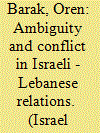

|
|
|
|
|
| Publication |
2010.
|
| Summary/Abstract |
The article discusses Israel's ambiguous policy towards Lebanon since the late 1960s and early 1970s and assesses its long-term impact on Israeli-Lebanese relations. Its main argument is twofold: first, Israel reacted to the gradual decline of Lebanon's effective sovereignty in the Lebanese-Israeli border area in the late 1960s and early 1970s by adopting an ambiguous policy, which, while recognizing Lebanon's formal sovereignty, sought to "make up" for its lack of effective sovereignty in the Israeli-Lebanese border area by stepping up Israel's involvement there; second, Israel's ambiguous policy towards Lebanon, together with other factors, such as the armed activities of Palestinian and Lebanese factions in and from South Lebanon, has been a major factor for the continuous violence in the Lebanese-Israeli border area, most recently the war between Israel and Hizbullah in 2006. I conclude with suggestions of how to put an end to the cycle of ambiguity and conflict in Israeli-Lebanese relations.
|
|
|
|
|
|
|
|
|
|
|
|
|
|
|
|
| 2 |
ID:
100074
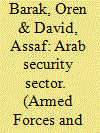

|
|
|
|
|
| Publication |
2010.
|
| Summary/Abstract |
This article discusses the lack of adequate attention to the Arab Security Sector and its complex political and social roles in the Arab States and presents the contours of a new research agenda for this topic. First, the authors demonstrate the insufficient scholarly attention accorded to the Arab Security Sector in several academic publications in the fields of Middle East Studies and Security Studies in the period 1990 -2005. Second, they focus on three major areas where recent theoretical and comparative advances in the study of civil-military relations have not been paralleled in the study of the Arab Security Sector: (1) the role of the Arab Security Sector in the process of state formation; (2) informal connections between actors within the Arab Security Sector and actors operating in the political system; and (3) the role of the Arab Security Sector in reflecting and reinforcing patterns of intersectoral relations in the Arab States.
|
|
|
|
|
|
|
|
|
|
|
|
|
|
|
|
| 3 |
ID:
112951
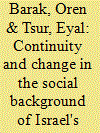

|
|
|
|
|
| Publication |
2012.
|
| Summary/Abstract |
This article discusses markers of continuity and change in the social background of Israel's military elite from the establishment of the State of Israel and the Israel Defense Forces (IDF) in 1948 until the present. This is done by analyzing an original database that we have created, which includes details on the social background of all 213 officers who were promoted to the ranks of major general (Aluf) and lieutenant general (Rav Aluf) - the two highest ranks in the IDF - and who served in its general staff during this period. The article also discusses the interplay between the characteristics of Israel's military elite, on one hand, and Israel's process of state formation and inter-sectoral relations, on the other hand.
|
|
|
|
|
|
|
|
|
|
|
|
|
|
|
|
| 4 |
ID:
080305
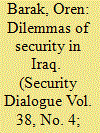

|
|
|
|
|
| Publication |
2007.
|
| Summary/Abstract |
This article suggests that much of the violence that has ravaged Iraq since the country's occupation by the US-led coalition in 2003 can be explained by focusing on the interplay between domestic and external factors that pushed Iraq's major communities (Shi'is, Sunnis, and Kurds) into conflict. The domestic factors include an intercommunal `security dilemma' that was engendered by the US-led invasion; the role of belligerent `ethnic entrepreneurs' within these communities; and the long-term animosities, apprehensions, and fears among their members. External factors include the disbandment of Iraq's ruling elite, regime, and security sector by the USA, along with the role of the Arab and Muslim volunteers who came to fight Iraq's foreign occupation. The article concludes by discussing the possible ramifications of the conflict in Iraq for domestic, regional, and international security, and mentions several steps that can help ameliorate it.
|
|
|
|
|
|
|
|
|
|
|
|
|
|
|
|
| 5 |
ID:
076556
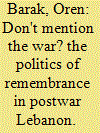

|
|
|
| 6 |
ID:
066944
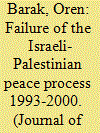

|
|
|
| 7 |
ID:
072277
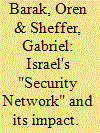

|
|
|
|
|
| Publication |
2006.
|
| Summary/Abstract |
This article discusses a critical factor that has influenced Israel's politics, society, economy, and public discourse since this state's establishment in 1948, and particularly after the 1967 war: a highly informal but at the same time very potent "Security Network." This Network has been critically involved in the political, social, economic, and cultural spheres, and its impact is felt in major and lesser issues. It is made up of actors who (a) are connected by informal, nonhierarchical ties; (b) share common values and perceptions regarding Israel's security and the ways to promote it; (c) have identical or similar individual and collective interests; and (d) are capable of joining hands to influence policymaking on different levels and in various spheres of the country's public life.
|
|
|
|
|
|
|
|
|
|
|
|
|
|
|
|
| 8 |
ID:
177006
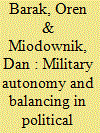

|
|
|
|
|
| Summary/Abstract |
This article argues that autonomous militaries can play a balancing role during major internal political crises. However, when militaries’ autonomy is curtailed by political leaders before the crisis, militaries cannot maintain the political balance between rulers and opponents, thereby increasing the risk of armed conflict. The article first explains the main concepts relevant to the discussion (autonomy, political crisis, balancing role), exploring their possible interlinkages and presenting several hypotheses. Subsequently, it discusses four relevant cases from the Middle East before and during the Arab revolts of 2010–2011: Egypt in 2011 and Lebanon in 1958, which demonstrate the balancing capacities of autonomous militaries during major political crises, and Lebanon in 1975 and Syria in 2011, which reveal that nonautonomous militaries cannot play a balancing role in such circumstances. The article concludes with several observations regarding the military’s balancing role during major internal political crises in divided and homogenous states.
|
|
|
|
|
|
|
|
|
|
|
|
|
|
|
|
| 9 |
ID:
184465
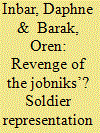

|
|
|
|
|
| Summary/Abstract |
For many decades, cultural representations of the military and military service in Israel, particularly in films and television series, tended to focus on male Sabra (Israeli-born) soldiers and their combat experiences, portraying them from either a ‘heroic-nationalist’ or a ‘post-heroic’ perspective. However, several recent Israeli films and television series bring to the fore men and women from different social backgrounds who serve as non-combatant soldiers (jobniks) far behind the frontlines. Such depictions of ‘anti-heroic’ soldiers expose previously underrepresented aspects of service in the Israeli military, ranging from subtle expressions of a lack of motivation to open acts of resistance. Based on an analysis of several notable films and television series featuring jobnik protagonists, we argue that although these works give voice to previously underrepresented social groups and accord legitimacy to soldiers’ acts of resistance, they simultaneously foster a more conservative discourse regarding military service in Israel by excluding other social groups and setting limits on individuals’ conduct within and outside the military. These findings suggest that while popular culture can challenge militarist tendencies, it may ultimately reinforce the military’s position as the ‘people’s army’ and the social norm of mandatory conscription.
|
|
|
|
|
|
|
|
|
|
|
|
|
|
|
|
| 10 |
ID:
193163
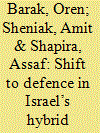

|
|
|
|
|
| Summary/Abstract |
This paper traces the significant change that has occurred in the balance between offense and defence in Israel’s ‘hybrid’ military strategy in recent decades. Relying on fresh materials concerning the organizational, doctrinal, and procurement processes of Israel’s military, we identify a shift from offense towards defence as the preferred way to protect Israel in the face of new security threats. We also show that due to rapidly changing security challenges, limited resources, and the military’s organizational culture, this change has been gradual, incremental, improvised, and largely informal. We propose that similar changes may characterize other states facing new security challenges.
|
|
|
|
|
|
|
|
|
|
|
|
|
|
|
|
| 11 |
ID:
077866
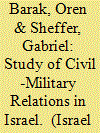

|
|
|
|
|
| Publication |
2007.
|
| Summary/Abstract |
The aim of the article is threefold: first, to define and examine the major approaches to the study of the relationship between Israel's security sector and civilian realms (political, social, economic, and discursive), which we refer to as the "traditional," "critical" and "new critical" approaches; second, to emphasize the theoretical and empirical "gaps" that exist in the scholarly treatment of the relationships between actors operating within both types of spheres, and particularly with regard to the more informal aspects of their interplay; finally, to suggest ways to overcome the lack of adequate treatment of these highly informal exchanges by employing insights from the expanding literature on policy networks and social networks and demonstrating how these networks, which can be identified in the Israeli case, influence general and concrete policymaking on both the national and local levels
|
|
|
|
|
|
|
|
|
|
|
|
|
|
|
|
| 12 |
ID:
068376
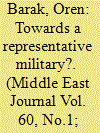

|
|
|
|
|
|
|
|